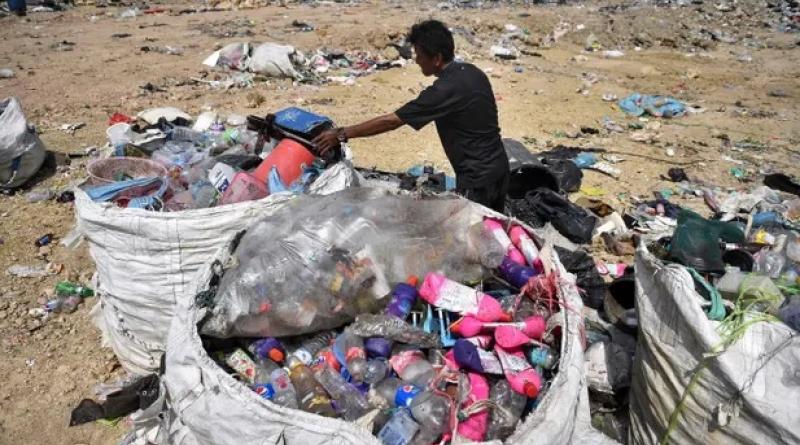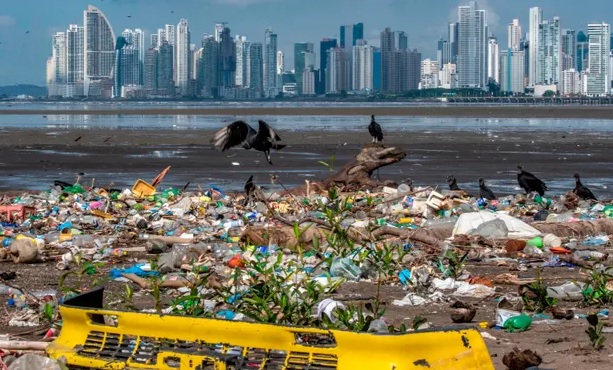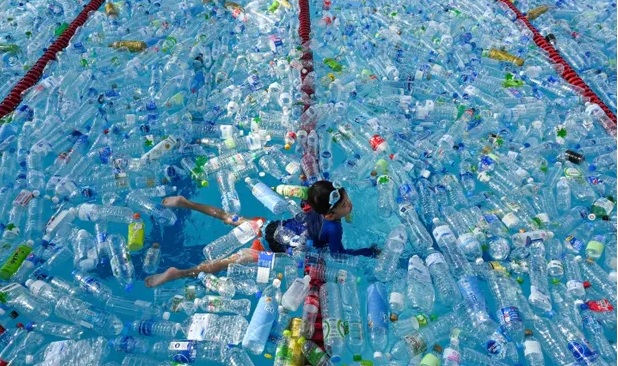Plastic waste entering oceans expected to triple in 20 years.

Current and planned waste-cutting efforts will reduce volume only by about 7%, say researchers
Plastic waste flowing into the oceans is expected to nearly triple in volume in the next 20 years, while efforts to stem the tide have so far made barely a dent in the tsunami of waste, research shows.
Governments could make drastic cuts to the flow of plastic reaching the oceans through measures such as restricting the sale and use of plastic materials, and mandating alternatives, but even if all the most likely measures are taken it would only cut the waste to little less than half of today’s levels, the analysis found.
Previous estimates put the amount of plastic reaching the oceans each year at about 8m tonnes, but the true figure is much higher at about 11m tonnes, according to the paper published in the journal Science.
If current trends continue, the amount of plastic waste polluting the oceans will grow to 29m tonnes a year by 2040, the equivalent of 50kg for every metre of coastline in the world.
All the efforts made and announced so far to cut plastic waste, by governments and companies, will reduce that projected volume by only about 7% by 2040.
The findings, in one of the most in-depth assessments to date of the plastic waste problem, reveal the devastating the impact of our reliance on plastic, especially single-use and film plastics used for packaging. Stemming the flow is crucial because once plastic is in the ocean, most of it stays there forever, breaking down into microplastics that cause other problems, and efforts to clean waste from the oceans have so far had little impact.
More stringent measures would produce a drastic reduction in waste, according to the researchers. These include improving waste collection, particularly in the developing world, and recycling more waste, as well as investing in alternative materials and better product design to reduce the amount of plastic used.
Such measures would require an investment of about $150bn globally in the next five years, but would yield $70bn in savings compared with the $670bn cost to governments of inefficient waste management between now and 2040, while cutting the greenhouse gas emissions associated with plastic by about a quarter, and creating as many as 700,000 jobs.

Despite rising public awareness of the plastic problem in the past five years, attempts to cut waste through plastic bag charges and bans on certain forms of microplastics have so far had little impact, said Simon Reddy, international environment director at the Pew Charitable Trusts, which led the research. “All the initiatives to date make very little difference. There is no silver bullet, there is no solution that can simply be applied – lots of policies are wanted. You need innovation and systems change.”
Such change will require governments to overhaul their waste systems particularly, but also to look at ways to design plastic waste out of products. But action was needed urgently, he said, as once plastic reached the sea it was almost impossible to get it out again.
“That there is likely to be three times more plastic waste by 2040 is a shocking revelation,” he said.
Reddy called on governments and investors to curb the planned expansion of plastic production. “Without this, the supply of large quantities of cheap virgin plastic to the market may undermine reduction and substitution efforts and threaten the economic viability of recycling, while making it even harder to close the collection gap [between waste produced and waste collected for disposal].”
Governments must also create incentives for businesses to adopt new models such as reuse and refill systems, he urged. “[That would] level the playing field, where currently virgin plastic feedstock has a cost advantage over recycled materials.”
New design standards would also be needed, and better collection systems in low- and middle-income countries.
Waste management is an often neglected area for governments in developing countries, where it is often left to an informal economy of waste pickers, who may suffer from exposure to pollutants and other dangers. Waste pickers are usually paid by the weight of material they collect, which makes it harder to collect some of the most harmful plastic products that find their way to the ocean, such as thin film material.
Although waste pickers and other workers in informal waste management systems are responsible for about 60% of global plastic recycling, “their contribution to preventing ocean plastic pollution has largely gone unrecognised and underpaid”, said Reddy.
Alice Horton, a scientist at the UK’s National Oceanography Centre, who was not involved in the research, said reducing plastic waste was cost-effective. “Even the toughest management approaches proposed [in the paper] will still lead to a cumulative increase in plastic pollution with in the environment,” she said. “Urgent and extensive interventions in plastic waste production and management are needed. Despite the scale and likely costs of such interventions, such a system overhaul is in fact likely to be more economically viable than the current scenario, due to reduced need for new material production.”

Stephen Fletcher, a professor of ocean policy at the University of Portsmouth, who was also not involved in the research, said businesses would have to be brought on board for any viable solution. “The key message from this paper is that even with huge changes to how plastics are produced, used, reused and disposed of, plastic pollution on land and in the ocean is here to stay,” he said.
Overhauling the world’s plastic and waste management systems would produce savings of about 18% compared with business as usual for taxpayers and governments, he noted, but many of the actions required would have to be done by businesses and their costs and incentives would need to be taken into account.
Fletcher said: “The extent to which such a shift [in the global plastic economy] is realistic is debatable, yet the paper demonstrates that the need for such a shift is urgent.”
The Pew Charitable Trusts and Systemiq, a consultancy, led the research, with collaboration from the Ellen MacArthur Foundation and Common Seas charities, academics from Oxford University and Leeds University, and a panel of 17 world experts.
The estimates do not take into account any potential increase in the volume of plastic waste resulting from the coronavirus pandemic.




